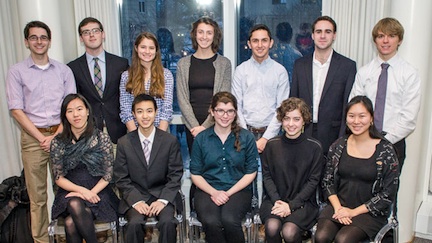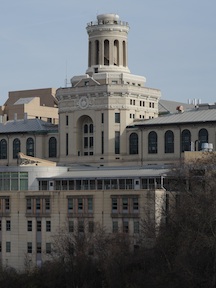On January 21, the Upsilon of Pennsylvania Chapter at Carnegie Mellon inducted 12 seniors into Phi Beta Kappa who were elected in the fall of their senior year (fall 2015).
The chapter is especially pleased to note that one of Carnegie Mellon’s newest ΦBK members, Jillian Jaycox, also has been named a Churchill Scholar. The award was announced in late January by Carnegie Mellon University News, following the initiation.
The ΦBK ceremony included a keynote presentation from Matthew Sudnik, himself a ΦBK member and 2005 graduate of the Catholic University of America with a BA in philosophy. Today, Sudnik is Director of the Baginski Scholars Program at Central Catholic High School, where he also teaches human geography and humanities. A transcript of Mr. Sudnik’s remarks is provided below.

Inducted at Carnegie Mellon January 21: Jeremy Applebaum, Chemistry; William Crichton, Computer Science; John Devine, Ethics, History & Public Policy; Eleanor Haglund, Creative Writing; Jillian Jaycox, Biological Sciences; Alison Kao, Computer Science; Joshua Kubiak, Chemistry; Kaytie Nielsen, BHA, Creative Writing and Drama; Lucy Pei, Global Studies; Benjamin Plaut, Computer Science; Margaret Stephenson, Computer Science; Weichin Yin, Mathematical Sciences and Physics.
Upsilon of Pennsylvania Chapter Initiation
Carnegie Mellon University
January 21, 2015
Keynote Address
by
Matthew Sudnik
(ΦBK, The Catholic University of America, 2005)
Director of the Baginski Scholars Program
Central Catholic High School
It is a great honor to address the initiation ceremony for students into the Upsilon Chapter of Phi Beta Kappa. It was a decade ago when I sat for the ceremony and keynote at my own induction. In preparation for this address, I’ve reflected on how I brought my own liberal education and commitment to Phi Beta Kappa into my teaching, and considered what schools and educators do to inspire a love of learning.
Let me begin with this brief, personal reflection:
After completing a broad course of studies in college, which included a concentration in philosophy, and earning a master’s degree in “the study of religion” from Harvard, I was invited to return to Pittsburgh to teach. While I had reflected on careers throughout my years of study, I always approached my formal education with learning–for-its–own–sake as my primary motivation. I chose classes based on my interests in literature, language, science, and politics, semester by semester. For those of us who are curious and enjoy taking classes, there is no better job than to work in a school. I came to Central Catholic, your neighbor in Oakland, in 2007 to direct an interdisciplinary studies program for the advanced students, the gifted and talented. Having a career as an educator is exciting not only because I can stand before a class of eager, curious young people. After a year of learning the job, I discovered that this profession also permits and actually encourages my continued pursuit of knowledge though broad, liberal learning. It is part of my job to read, write, reflect, attend lectures, and participate in seminars and symposia. As I began to attend evening seminars at the University of Pittsburgh and here at Carnegie Mellon, I was introduced to a community of learned educators, both in K–12 education and in the academy. These seminars led to travel opportunities as well. I have traveled to ten foreign countries over the past eight summers on study tours for educators. For example, in 2009
I traveled to Egypt and learned about the stresses and strains on the Egyptian political system from professors at Cairo University, two years before the Arab Spring. In 2014, I studied Mozart’s operas in Vienna, Austria on an institute sponsored by the National Endowment for the Humanities. And, I have visited schools and met fellow educators in Israel, China, Japan, Turkey, and most recently, Cuba. Have I convinced anyone to enter the teaching profession?
In short, to be successful in my chosen career, I must continue to read and study, keeping up with new perspectives, arguments, texts, and authors. I must travel and learn more about the ever changing world. And, I must bring my reading and studying, travel and experience, back to my students. For me and my career, love of learning is still a guide of life, and what a pleasure it is!
Having discussed my own work, I fully understand that not all professionals have the same opportunity to immerse themselves in perpetual, liberal studies or educational travel. In the past few years, especially since the financial crisis and recession, we have been presented with a dichotomy between education in the liberal arts and pre–professional education. While I spend my free time studying opera and reading history, most careers require daily application of practical, professional skills, and, we all know that the highest paying jobs often require skills that are acquired at higher levels of education. I doubt that anyone here today would not like to see every new initiate achieve the highest levels of professional success. Practical, pre-professional education, what I will refer to as “training” is not to be dismissed. To illustrate this point, consider the studies of philosophy and medicine. “[One] could get a medical degree and still, to some extent, practice philosophy,” ”But if [one] stayed in philosophy and tried to practice medicine, [you would] probably [be put] in jail.” Pre-professional training is not to be dismissed. And those of us who are educators must be careful advising students away from training out of a singular allegiance to our chosen academic disciplines, departments and classes.
At this time, the rising cost of college and the precarious nature of employment have led some – not only business leaders – but also university administrators and policy makers, as well as students and their parents, to question the value of a broad liberal arts education. To be clear, I believe that both forms of education have value – both yield significant goods. Once cannot practice medicine or law without a license.
However, in my opinion, training without a broad liberal education is empty. Literature and the study of foreign languages, far more than professional training, cultivates empathy. Philosophy and study of the hard sciences cultivate critical thinking and perpetuate our sense of wonder. It is my belief that careers in the 21st century require both liberal education and pre-professional training, not either/or. My own career requires both. I must have training in pedagogy and an education in history, literature, philosophy, and writing.
With that said, while some of us may need further professional training in order to succeed at our chosen career, I would like to suggest that everyone needs a liberal arts education. Our schools and universities, our local and national governments, should be promoting the liberal arts more, not less. Far from being the privilege and pastime of society’s elites, a liberal education is a requirement for a functioning and thriving democracy.
In her 2010 book Not for Profit: Why Democracy Needs the Humanities, Martha Nussbaum, professor of law and ethics at the University of Chicago, asks,
What does it mean for a nation to advance? In one view it means to increase its gross national product per capita. This measure of national achievement has for decades been the standard one used by development economists around the world, as if it were a good proxy for a nation’s overall quality of life (14).
I have heard politicians and business leaders scold us for not promoting enough training and identify the humanities as frivolous study. In their estimation, an increased emphasis on business culture is required to make our nation great.
However, Professor Nussbaum also points out that:
Most of us would not choose to live in a prosperous nation that had ceased to be democratic. Moreover, although it is clear that a strong business culture requires some people who are imaginative and critical, it is not clear that it requires all people in a nation to gain these skills. Democratic participation makes wider demands (11).
While our colleagues in the field of engineering have the monumental task of building structures and our colleagues in business have the task of building monetary wealth, what practical thing are we tasked to build? Let me suggest it is our society, specifically a democratic one.
Consider the social, political, and economic challenges facing our society. We must first keep in mind that we cannot engage in serious democratic debate if we have no basis for our claims. How can we argue whether some religions are violent or peaceful if we have not studied these faith traditions with any seriousness? How can we engage in argument over how best to use our natural resources and preserve our planet if we ignore the learning of chemistry and ecology.
Consider what schools can do to inspire a love of learning. I think we must engage our students with the big issues of our time. In other words, we must present our students with serious problems and challenges that demand a careful, often collaborative, response. Consider global economic inequality. Each year, I require my students to study the concept of development in a county through the lenses of politics, economics, demographics, culture, and ecology. Since I am not an expert in each of these disciplines, I have reached out to experts in this community – for example, scholars here at Carnegie Mellon – to guide our students’ research. It is through this effort to understand the many places in our world and to engage with the students as a community of scholars that deep learning happens. In this process, students are transformed and inspired, educators continue to learn, and democratic engagement grows – we explore common problems together and search for solutions based in careful learning rather than conjecture. We choose the lifelong work of seeking knowledge over the facile shortcut of assumption. I believe it is within our communal effort to understand the world deeply and engage with its most serious concerns that we rediscover the love of learning and realize that it is our most consistent and faithful, albeit demanding, guide of life.
Information was provided courtesy of Joseph E. Devine, Chapter Secretary and Associate Dean for Undergraduate Studies at Carnegie Mellon.





